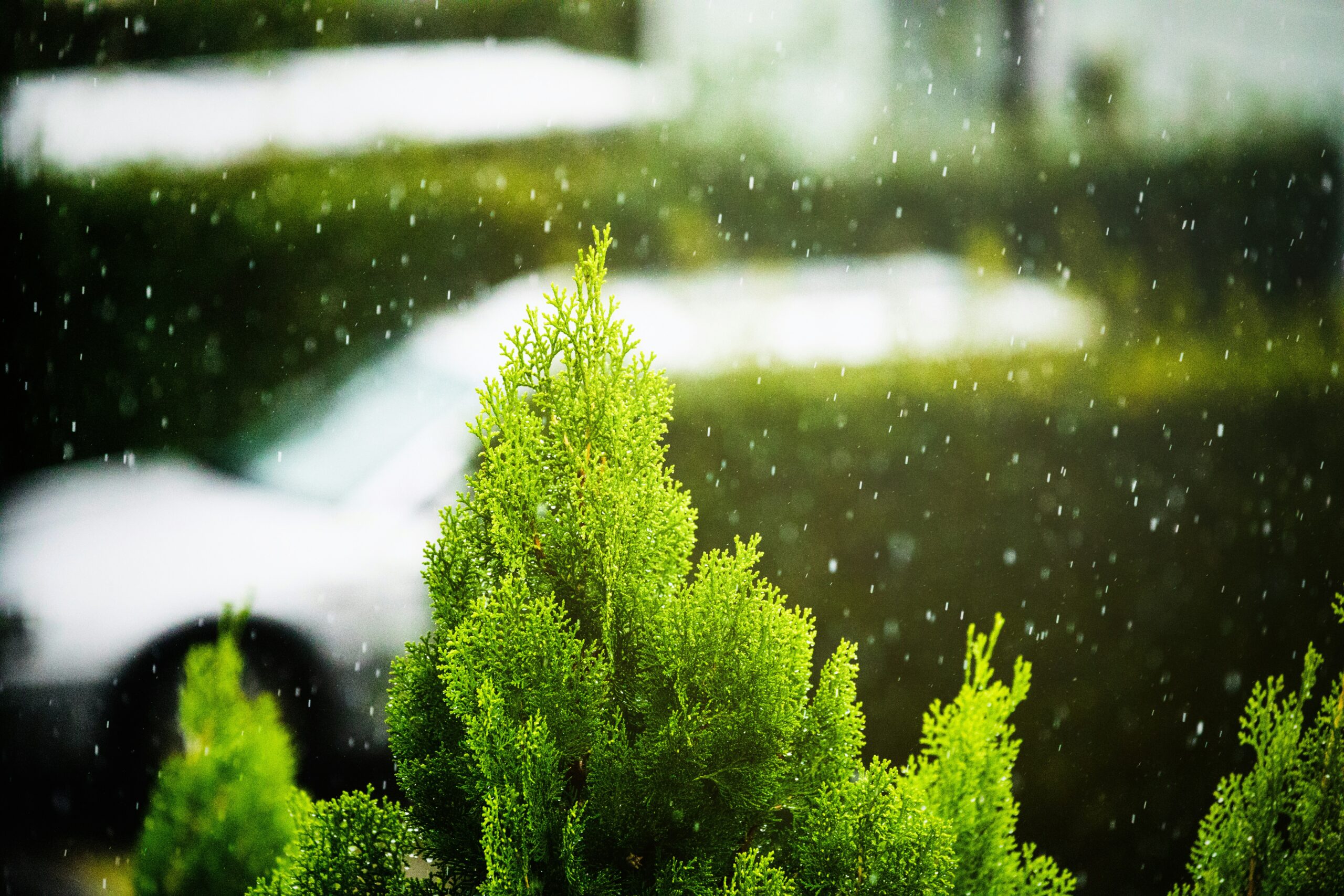
Mosquitoes thrive when it rains. They need a hot, humid environment with access to standing water to lay their eggs. A few simple steps before the rain comes can help protect you and your family from a mosquito swarm in your backyard.

Combined with increased humidity, the standing water creates favorable conditions for mosquitoes to continue to grow and reproduce, thus increasing the overall activity on a property. Best practice is to walk the property and check for and empty any containers holding water. After rain, it is best to check every 1-2 days. Mosquitoes develop from egg to adult mosquitoes in about 7 days, so emptying containers holding water will break the cycle and prevent the larvae from maturing into adult mosquitoes.
A few simple steps can help you avoid mosquito bites after it rains, such as:
- Empty anything holding water
- Clean gutters
- Maintain landscaping
- Ensure proper drainage on property
- Wear protective clothing like long sleeves and pants during and after rain
Why Mosquitoes Thrive After Rain
Most people notice a sharp increase of mosquito activity (and mosquito bites) after the rain. Rain creates additional breeding grounds for mosquitoes, which they can take advantage of. Mosquitoes do not need to hide from the rain. Their unique biology allows them to continue flying in the rain.
Their presence often increases after rain, and understanding why can help you take necessary precautions to protect yourself and your loved ones. So, do mosquitoes come out in the rain? The answer is yes, mosquito populations can boom after a rainfall.
Watch a Mosquito Fly in the Rain
Mosquitoes have a unique life cycle that includes four stages: egg, larva, pupa, and adult. Female mosquitoes lay their eggs in standing water, and rainfall plays a crucial role by creating small pools of standing water—perfect breeding grounds for mosquitoes.
What are the peak mosquito activity times after a rainfall?
Peak mosquito activity after rainfall is after one week. Mosquitoes develop from egg to adult in seven days. Emptying containers of water prevents mosquito larvae from maturing into adults.
How long does it take for mosquitoes to hatch after a rain?
Mosquitoes can start hatching 24-48 hours after the rain stops.
Types of Mosquitoes after Rainfall

Rainfall creates breeding grounds for different mosquito species. Mosquito eggs only need a little bit of water to hatch.
Floodwater Mosquitoes
Floodwater mosquitoes are a type of mosquito that thrive in areas that experience periodic flooding or standing water. The ideal environment for floodwater mosquitoes includes temporary or seasonal bodies of water like flooded fields and ditches. Floodwater mosquitoes lay their eggs in these types of environments, and the eggs can remain dormant for extended periods until they are flooded, triggering the hatching process. This allows floodwater mosquitoes to quickly proliferate after heavy rains or flooding events.
Container Mosquitoes
Aedes or container mosquitoes, also known as “urban mosquitoes,” thrive close to human habitats. These are the mosquitoes most likely to bite you after it rains. The females are constantly looking for standing, fresh water to lay their eggs. Their ideal breeding grounds include old tires, clogged gutters, birdbaths, flower pots, toys, and puddles on the ground.
These mosquitoes can hatch from eggs to mosquito larvae to biting adults in a matter of days.
Culex Mosquitoes
This type of mosquito uses stagnant pools of water with high bacteria content as breeding grounds. Typical areas include abandoned pools, underground storm drain pipes, pooled creek beds, or large containers such as barrels, trash cans, or wheelbarrows.
Culex mosquitoes carry disease-carrying and pose a public health risk.
Preventing Mosquito Infestations After Rain
After heavy rain, mosquitoes tend to multiply rapidly, posing a threat to outdoor activities and overall well-being. MissQuito offers effective solutions to prevent mosquito infestations after rain.

Mosquitoes have heavily increased with all the rain we’ve had. To help curb mosquito activity during the rainy times, it is important to maintain your property as best you can by removing/emptying any stagnant water sources. Even something as small as kids toys or a bottle cap, can be a breeding area for mosquitos. Bird baths should be emptied after each rain, and pretty often when it is not raining, to keep the mosquito larvae from growing.
Reduce Mosquito Breeding Grounds Before it Rains
One of the most important steps in mosquito control is eliminating standing water around your property. Mosquitoes breed in stagnant water, so it’s crucial to remove any potential breeding sites. Empty containers like buckets, flower pots, and bird baths to prevent water accumulation.
Regularly clean out clogged gutters and drains to avoid water pooling.
Ensure that your outdoor furniture, toys, and equipment are properly stored and covered to prevent rainwater from collecting.
Eliminate Mosquito Hiding Spots
Mosquitoes can fly in the rain, but most of them avoid direct sunlight.
Maintaining a clean and well-maintained outdoor environment is also crucial in mosquito control because it eliminates the most common hiding spots.
- Trim your grass regularly
- Remove any overgrown vegetation
- Keep your yard free of debris, such as leaves and grass clippings.
- Ensure your property has proper drainage
MissQuito Tip: Consider using outdoor fans on your patio or deck. Mosquitoes cannot fly against even the gentlest of airflow.
Protecting Yourself from Mosquito Bites After Rain
Mosquitoes are not only annoying but can also pose health risks, especially after rain. To minimize your exposure to these pesky insects, here are some effective ways to protect yourself:
1. Wearing protective clothing and using mosquito nets:
One of the simplest ways to keep mosquitoes at bay is by wearing long-sleeved shirts, long pants, and socks when spending time outdoors. Additionally, using mosquito nets while sleeping can provide an extra layer of protection, ensuring a mosquito-free zone while you rest.
2. Choosing the right mosquito repellents for personal use:
When selecting mosquito repellents, it’s essential to choose products that are both effective and safe. Look for repellents containing ingredients like DEET, picaridin, or oil of lemon eucalyptus (OLE), as these have been proven to be effective against mosquitoes. Remember to follow the instructions on the product label for optimal use.
3. Creating a mosquito-free zone in your home:
Mosquitoes can find their way into your living spaces, so it’s important to take preventive measures. Keep windows and doors closed, especially during dawn and dusk when mosquitoes are most active. Use window screens and seal any gaps or cracks to prevent their entry. Additionally, consider using indoor mosquito traps or electronic repellents to further enhance protection.
By following these simple strategies, you can greatly reduce your chances of getting bitten by mosquitoes after rain. Remember, prevention is key when it comes to protecting yourself and your loved ones from mosquito-borne diseases.
Mosquito Control Treatments from MissQuito
One of the most effective ways to prevent mosquitoes on your property is to use a mosquito control treatment for your yard. At MissQuito, we avoid applying treatment while it is raining because it is ineffective.
MissQuito Treatment Before the Rain
As long as a treatment has had time to dry, roughly about an hour, it is perfectly ok to treat before rain. We utilize additional surfactants that increase the rainfastness and overall performance of the products. They also help the product to adhere to and penetrate into the leaves of plants and bushes, resulting in better coverage.